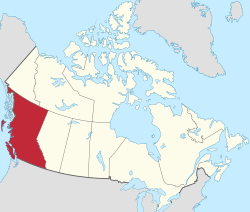Ministry of Children and Family Development (British Columbia)
| Provincial ministry overview | |
|---|---|
| Formed | June 5, 2001 |
| Type | child protection service |
| Jurisdiction | province of British Columbia |
| Headquarters | Victoria, British Columbia |
| Annual budget | $1.3 Billion Canadian dollar 2014-15 |
| Ministers responsible | |
| Website |
mcf |
| Map | |
 | |
The Ministry of Children and Family Development (MCFD) of British Columbia, Canada is the child protection service across the province and is provided through 429 ministry offices in 5 regions and a number of delegated Aboriginal agencies. The child protection staff are supported by the provincial office of the Child Protection Division.[1]
Criticism of MCFD for failure to protect children
Ted Hughes (judge) authored a report critical of MCFD and issued recommendations to prevent further deaths of children involved with MCFD.[2] MCFD has been repeatedly been criticized for failing to implement recommendations of the Hughes Report.[3]
Foster Care
In British Columbia Foster care is one option for providing homes for children who can't live safely with their own parents or caregivers. Foster parents provide the day-to-day care for a child on behalf of MCFD. These foster parents are rarely screened in any way that is substantial to ensure that they can actually raise these children, most of whom were wrongfully removed from parents of these children. It is actually harder to become a "foster home" for an animal than it is to become a foster parent to children.
Types of care homes
Any child or youth placed in foster care must be placed in a MCFD approved facility. There are two main types of foster care arrangements, family care homes and specialized residential services. These services are both directly funded by MCFD.
Family care homes
A family care home is a home that provides a family like atmosphere to children who cannot be cared for in their own home. The families in these homes provide the most parent like care to children in their care while still providing the child support with their parents and other extended family members when possible.
There are five different levels of family care homes which include: regular family care, restricted family care, and specialized family care, Levels 1, 2, and 3.
Restricted foster homes
A restricted foster home placement is that in which a child is placed in the home of a relative or someone who knows them already. The home needs to be approved by MCFD prior to placing a child in it.
Regular family foster home
A regular family foster placement is that in which a child is placed in a home approved by MCFD to provide care for the child. These placements provide care for children of various ages and abilities. They are different from restricted foster homes in the sense that these families don’t usually know the child before they are placed in their care.
Specialized family homes
A specialized family care home placement is that in which the child who requires the care has moderate to extreme behaviour, developmental delays, or health problems. The three levels of specialized care all require the caregiver to have specialized experience and training. There is also a specific approval process in place to be able to care for these types of children. Levels 2 and 3 may sometimes
provide specialized intervention and assessment services.
Specialized Residential Services
Specialized residential services include services such as group homes, intensive child care resources, and treatment foster home programs. These services may be operated by an individual, a nonprofit organization or a private organization.
Funding for Foster Homes
The amount of funding a family receives for a child in their care varies according to the type of care being provided as well as the age of the child. As of April 2009 a regular or restricted foster home receives $803.82 for a child aged 0–11 and $909.95 for a child aged 12–19. Specialized family homes receive more funding depending on what level of care they provide. On top of this funding that governments give foster parents they are often found asking the parents for items like clothing and other amenities that this money is supposed to help pay for. The parents that have their children removed lose all rights to any government funding they receive. Here is a funny fact, when the parents have these children in their care they only receive about $300 per child from the government yet a foster parent receives over $800. Often these foster parents refuse to give proper care and attention to the children they receive this money for. This begs the question: Do these foster parents simply become foster parents to gain a pay check?
Rights of children and youth in care
In December 2008 The Federation of BC Youth in Care Network released a handbook Your Life – Your Rights which explains the rights of youth in care in a youth friendly manner.[4] The Ministry of Children and Family Development continues to ignore the rights of children in care. Often forcing them to go to Christian church when the family is not a religious one. The children are often punished and scolded if they speak their minds. Some children are forced to speak with their well known abusive fathers. When parents speak up for their children they are often punished with the removal of access to their children.
Further reading
Foster Care in British Columbia
References
- ↑ "Ministry of Children and Family Development". Retrieved March 4, 2011.
- ↑ BC Children and Youth Review
- ↑ Final Progress Report on the Implementation of the Recommendations of the BC Children and Youth Review
- ↑ Your Life - Your Rights